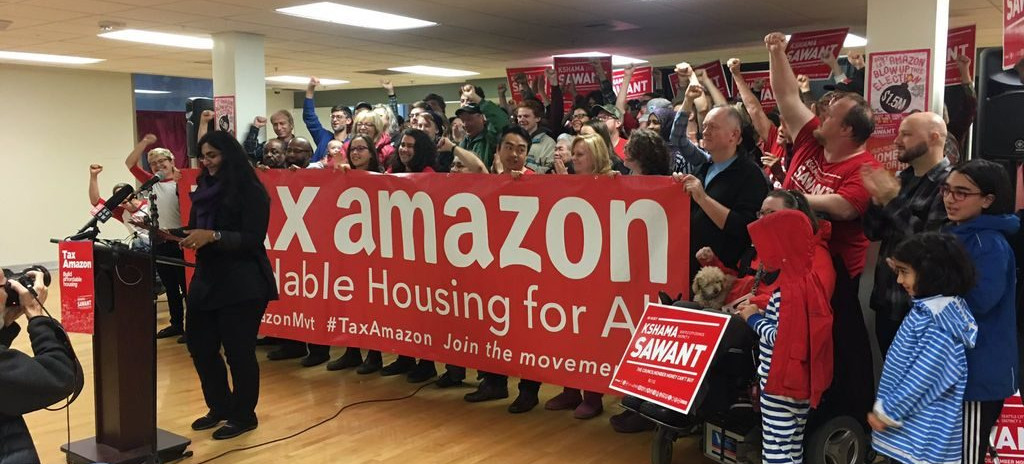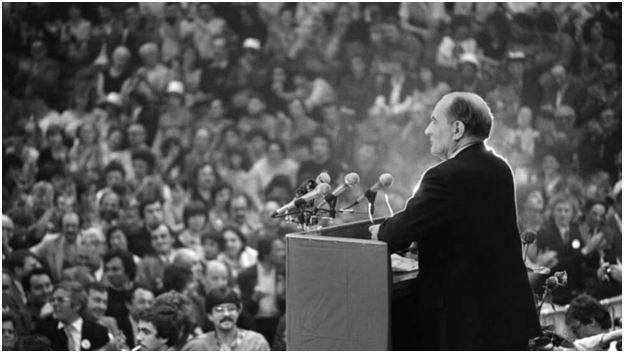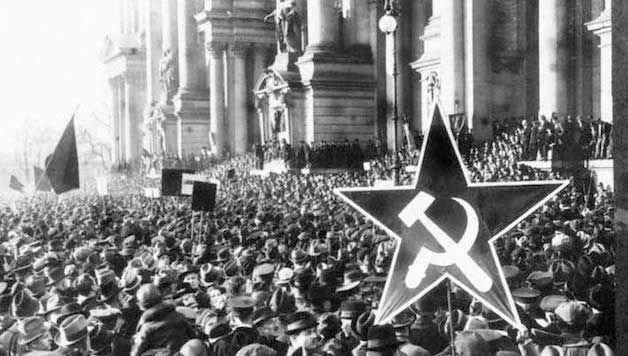Kshama Sawant Re-Elected Despite Corporate PACs Spending $4 Million to Buy City Council
Despite big business and Amazon going all-in behind corporate candidates in all seven city council races, Seattle voters rejected Jeff Bezos’s bid to flip the council to the right. In Seattle’s most-watched, most expensive, and most polarized council race in decades, Socialist Alternative’s Kshama Sawant has won re-election.
Watch the victory press conference here.
After election night returns showed Seattle’s socialist City Councilmember behind by 8 points, with 46% to Egan Orion’s 54%, the corporate media and big business sounded triumphalist. But 60% of late arriving ballots counted in the following days swung dramatically toward Kshama Sawant. At the final count Sawant had crested 4% points over Orion with a lead of 1,693 votes.
Declaring victory at a press conference the following day, Sawant said: “These election results are a repudiation of the billionaire class, of the richest man in the world, of corporate real estate, of the establishment.”
Washington State’s mail-in ballot system allows voters to mail in their ballots up to three weeks before election day. Early voters tend to be older and wealthier, with later voters being disproportionately younger, working class, and renters – those more likely to vote socialist. This year the late ballot bump for Sawant was bigger than ever. Even our critics in the corporate media were forced to credit Socialist Alternative’s record-breaking get-out-the-vote operation.
The high turnout was driven also by the movement base and support Sawant has built over the past six years, through which working people have won historic victories like Seattle’s groundbreaking $15 minimum wage and landmark renter’s rights laws.
A growing wave of outrage swept Seattle in the final weeks of the election after already unprecedented corporate PAC spending was compounded by Amazon’s $1 million “money bomb” dropped on Seattle on October 14. This brought Amazon’s total contribution to the Seattle Chamber of Commerce PAC to $1.5 million, and corporate PAC spending as a whole to over $4.1 million – approaching five times the previous record!
Sawant had won support over the hard-fought campaign from a substantial majority of Seattle unions along with a number of major endorsements like Sierra Club, The Stranger newspaper, and many progressive community leaders in the city.
But following Amazon’s money bomb, a number of major national political figures also weighed in against Jeff Bezos, followed by a wave of national media attention. The Wall Street Journal’s Editorial Board complained that “Bernie Sanders tweeted this week that Amazon’s spending in Seattle was ‘a perfect example of the out-of-control corporate greed we are going to end.’ Elizabeth Warren decried Amazon for ‘trying to tilt the Seattle City Council elections in their favor,’ adding that ‘I have a plan to get big money out of politics.’”
Yet while the massive spending by Amazon backfired with many voters, the $1.5 million also bought a torrent of ads, mailers, and paid canvassers, all of which swayed other votes in the direction of Sawant’s corporate-backed opponent. Campaign volunteers repeatedly encountered the talking points trumpeted through these richly-funded attacks in the final weeks.
Crucial to overcoming those lies and attacks was the thousands of conversations on the doors and at street corners by Socialist Alternative members and volunteers.
Who Runs Our City?
Warning that Bezos’s $1.5 million gamble to defeat Sawant and other progressives may have backfired, Seattle Times columnist Danny Westneat said: “[the election] could well be a referendum on Amazon and corporate power” (10/23/19).
Socialist Alternative had foreseen the potential for an Amazon-led corporate offensive from day one. In January, Sawant stated: “What’s at stake this year is who runs Seattle – Amazon and big business, or working people.”
The corporate media, with the Seattle Times at the forefront, waged a relentless corporate propaganda offensive to blame Sawant and other so-called “left ideologues” for the failed “performance of the City Council” in addressing Seattle’s housing affordability and homelessness crisis — the top concern for voters. The paper endorsed Amazon-backed candidates in all but one city council race, portraying them as “change” candidates.
In reality, Seattle’s affordability crisis is part of the global failure of capitalism, which treats housing as a commodity to enrich billionaire speculators, rather than as a basic human right. Working people are right to be angry at the inaction of city, state, and federal authorities to address the crisis. But blame for this falls squarely on a political establishment that is complicit with corporate power, not on activists and political leaders like Kshama Sawant calling for bold solutions like rent control and taxing big business to massively expand social housing.
Amazon executives’ chosen opponent for Kshama was Egan Orion, a fully corporate candidate who posed as a “progressive” to win votes, but whose campaign was fueled by a tsunami of corporate cash. This included both massive PAC funding as well as direct donations from a who’s who of big business leaders, including top Amazon executives, real estate lobbyists, and rich Republicans.
A Socialist Program
Sawant’s campaign led the charge for rent control in Seattle, building on momentum from our many years of campaigning on this issue, as well as victories in Oregon, New York and California which took place over the course of the year. The demand for universal rent control in Seattle, without corporate loopholes, energized working people around the district and city, and Kshama’s council office rapidly gathered 13,000 petition signatures. Our socialist council office also organized a mass rally attended by over 400 people in July, and later a packed City Council committee meeting to introduce the rent control ordinance — helping build a powerful dynamic which put rent control front-and-center in the political debate taking place in Seattle.
In spite of the defeat of the Amazon Tax repeal the prior year, from the beginning our campaign we demanded the restoration of the tax as well a number of other taxes on big business and the rich — instead of taxing ordinary working people, homeowners and small businesses. While Kshama’s opponent under pressure said he supported “progressive taxation” in the abstract, he rejected the Amazon Tax — a bottomline requirement of his corporate backers — but in so doing revealed his corporate political loyalties.
Sawant’s campaign also boldly fought for a Green New Deal for working people to make Seattle 100% renewable energy based by 2030, including massive expansion of public transit — making it fully electric and free. The campaign also tied the fight to avoid climate catastrophe to the need to take the big energy corporations into democratic public ownership and retooling them for clean energy. Kshama spoke alongside Tammy Morales and Shaun Scott at the September 20 Climate Strike, and increasingly youth and college students were drawn to our campaign and its socialist program for a Green New Deal.
Debate on Seattle’s Left
Once again, Seattle has shown that socialists and working people can take on the most powerful corporate titans and win. This victory should give confidence to movements everywhere, from the recent wave of mass anti-austerity and democracy protests spreading across the globe, to the youth climate strikes, labor battles, as well as other socialist election campaigns, including Bernie Sanders’ crucial fight for the presidency.
Yet it would be a major mistake to imagine that similar victories can be won purely through determination and struggle. The role of Marxist perspectives, program, and organization was essential in Seattle and will be vital to defeating the concentrated power of the capitalist class everywhere.
Socialist Alternative members provided the backbone of this campaign. Their energy, self-sacrifice, and political skills successfully built perhaps the most powerful grassroots election campaign in Seattle history.
We brought our socialist politics to ordinary people in District 3 with over 1,000 volunteers and SA members knocking on over 225,000 doors and making 200,000 phone calls, while raising over $570,000, with a median donation of $20. We smashed all previous records for both total raised and the number of donors.
Our ability to build left unity with other forces was also important to our victory over Bezos.
At the start of the election campaign, a de-facto alliance between big business, key labor leaders, and most liberal political figures had coalesced to try and defeat Sawant and block the election of Democratic Socialists of America candidate Shaun Scott in District 4.
After an avalanche of corporate cash against her, years of relentless attacks in the corporate media, no endorsements from her fellow city councilmembers or other prominent Democratic Party politicians, and a section of labor leaders backing one of Sawant’s opponents, Sawant received just 37% in the primary election. While this result put her more than 15 points ahead of Egan Orion, she was portrayed as a long shot for the general election by the corporate media. Our perspective was that in order to win the general election it would be crucial to expose the corporate character of Orion’s campaign, and to build left unity against Amazon’s attempt to buy City Hall.
The Fight for Unity Against Amazon
In spite of the considerable working class support for Sawant, if she and Socialist Alternative had adopted the approach of most liberal and labor leaders to try and avoid a direct confrontation with Amazon, it’s likely Jeff Bezos’s strategy would have succeeded. There was nothing automatic about the widespread working-class distrust toward corporate power getting organized into a coherent fightback.
In fact, most elections across the U.S. don’t feature bold working-class challenges, given the corporate domination of the two-party system. Even in Seattle, where the local Democratic Party organizations have shifted leftward under the impact of Sanders and other left challengers, this hasn’t resulted in strong working class fighters running for city council in most races.
Socialist Alternative based our electoral strategy on confidence that, if offered a fighting lead, working class and young people in Seattle were capable of defeating Amazon and big business. This included the need to use working-class pressure from below to push progressive and labor leaders off the sidelines and into a united fight with us against Seattle’s corporate establishment.
The dynamic unleashed after the primary election confirmed our strategy. Candidates backed by Amazon and big business moved on to the general election in all seven council races, facing off against more progressive candidates. With the looming threat of the Chamber of Commerce engineering a wholesale takeover of City Hall, our call for maximum unity against big business rapidly gained traction among grassroots activists, exerting pressure on bigger political players.
More endorsements for Sawant, as well as Shaun Scott, began rolling in from progressive leaders and groups who had sat on the sidelines in the primary. The scandalous effort of conservative labor leaders to win the Labor Council’s endorsement for Egan Orion was defeated when over 300 union members signed an open letter in protest. A joint event promoting a Green New Deal for Seattle was organized with Sawant, Morales, and Scott speaking, in an important display of left unity.
In a major defeat for the business-backed Democratic establishment who have long-dominated city politics, local Democratic Party groups endorsed both Kshama Sawant and Shaun Scott in September (they had already endorsed Morales in the primary). Sawant is the first independent socialist ever endorsed by Seattle’s Democrats, and this endorsement was made despite her very public calls for left Democrats, labor, and social movements to join together to build a new party for working people. This victory was the product of an energetic grassroots effort, including passing resolutions by local Democratic Party groups condemning corporate PAC spending.
All this laid the basis for our re-election campaign to become the central driving force behind a unified response when Amazon dropped their $1 million money bomb on October 14. Alongside the Democratic Party groups, we organized a press conference two days later outside of Amazon headquarters, followed by rally called by Amazon workers a week later.
A wave of national media coverage followed. In a high profile reversal, even Lorena Gonzalez and Teresa Mosqueda – the liberal city councilmembers who had publicly called for Sawant’s defeat in the primary – felt compelled to speak at the rally against Amazon and announce their endorsement of both Sawant and Scott.
Our united front strategy to mobilize working class anger to pull together a broader opposition to the attempted corporate takeover helped deal the final blow to Bezos.
The role of Socialist Alternative, with our clear analysis, strategy, and class struggle approach, was central to the success of this historic campaign. As the wave of socialist election campaigns across the country continues to expand, the rich lessons of how we defeated Jeff Bezos in his hometown can help serious organizers develop winning strategies for the struggles of working people everywhere.




